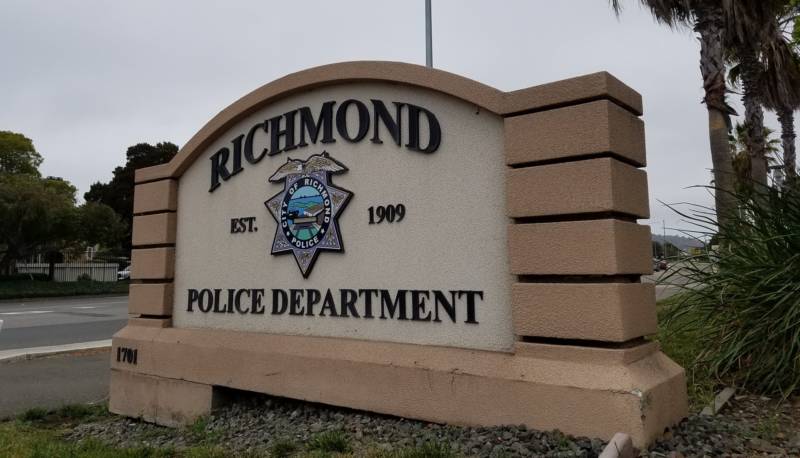The Police Department did not respond to KQED's requests for comment Monday.
On Friday, Alameda County District Attorney Nancy O'Malley announced that she intends to charge seven current and former police officers for their conduct related to Guap. Those pending charges include felony oral copulation with a minor against an Oakland police officer and a former Contra Costa County sheriff's deputy.
O'Malley said Friday that her office's investigation had turned up potential crimes in San Francisco, San Joaquin and Contra Costa counties, but she has no authority to prosecute outside her own jurisdiction.
The Richmond Police Department's investigation focused only on Richmond officers and employees, and it uncovered no criminal wrongdoing, according to the report.
"Each case is unique. We found no conspiracies," Police Chief Brown wrote. "The facts show individual, unconnected, non-criminal engagements and other activities that violate multiple Department policies and the professional Code of Ethics on the part of several RPD officers."
The Richmond Police Department's findings will make up recommendations for discipline, according to the mayor's office, which will also include input from the city's Department of Human Resources. Richmond's city manager will make the final call on officer discipline, a representative of the mayor's office said.
A coalition of advocacy groups have criticized Richmond's response and Guap's relocation to Florida, where she was recently arrested during an altercation at an addiction treatment facility.
She was charged Monday with misdemeanor battery, according to the East Bay Times. O'Malley said last week that her office's prosecutions were held up because of Guap's unavailability, who she calls "Ms. A."
“We were not consulted,” she said of the woman's departure to Florida. “We were not informed. And we protested once we learned she had been moved. We are now working to get Ms. A back here. And if the agency that sent her to Florida does not pay for her to come back, we will pay her airfare to come back to the state.”
Characterizations that Richmond police "'sent' this teenage witness away or had her 'removed' to Florida distort reality," Brown wrote, noting that Richmond "did not pay for rehab or any related expense."
Guap's transfer to Florida followed her discussions with Richmond investigators about prior victimization unrelated to law enforcement sexual misconduct, according to the report. The Richmond Police Department's Domestic and Sexual Violence Unit supported her application to the California Victim Compensation Program for help with money for treatment, "and it was ultimately funded," Brown wrote.
Richmond police investigators reviewed 10,000 text messages and cellphone records and 5,000 social media pages, according to the report. Their investigation included five recorded voluntary interviews with "the teenage witness" that spanned a total 13 hours. Investigators also contacted some 45 others.
The report does not include a detailed account of how many Richmond officers can expect discipline, and for what misconduct. The reason, according to Brown, is due to strict state law protections of police personnel information:
All government employees have Fourth Amendment privacy protections granted by the US Constitution over their jobs -- and in California, police officers have a more detailed set of protections spelled out under The Public Safety Officers' Procedural Bill of Rights Act. Each separate violation of the Act results in a $25,000.00 fine.
[...]
Accordingly, I cannot provide a detailed accounting on corrective and or punitive recommendations affecting the subjects of our investigation. Recommendations vary in severity and span the graduated scale of options, and range from termination from employment to letters of reprimand and corrective counseling - all in proportion to the respective employees' sustained misconduct violation(s). The investigation also exonerated/eliminated some.
Richmond Police Chief Brown began his report with an apology for the embarrassment the allegations carry:
"I'm sorry that the alleged misconduct of a few has brought embarrassment to the City and to the RPD -- embarrassment exacerbated by continuous news media coverage of the salacious Bay Area sex scandal news story," he wrote.
The Richmond Police Department first learned that some of its officers might have been involved with the woman in mid-May. But state law prohibits the sharing of personnel investigations between agencies, "so we had no named or accused employees to focus on at that time," Brown wrote, citing a KRON4 story from May 23.
Brown noted that the names of five Richmond officers allegedly involved in the scandal were published by the East Bay Times in a June 30 report:
In interviews with this newspaper, Guap identified high-ranking Richmond police officers she had sex or sexual contact with after she turned 18 in August: Lt. Andre Hill, a department spokesman; Sgt. Armando Moreno, who has worked the graveyard shift; resource officers Jerred Tong and Terrance Jackson; and Sgt. Mike Rood.
Brown called the "adult female teenager" at the center of the scandal a "self-admitted sex worker" who confounded his department's efforts to protect her dignity with a "lack of reticence to be so publicly braggadocious about her own behavior and health issues."
"Various legal and other privacy restrictions apply, so we cannot offer a more granular public report on this personnel investigation," Brown wrote. "We've strategically withheld certain details, not because we're trying to hide the truth, or hide from it but to protect privacy. Every public statement that we could make about this case invites more questions than we can answer without significant consequence. No criminal matters are at issue."
Read the full report below:
Julie Small of KQED News contributed to this report.
